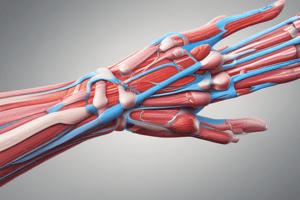Podcast
Questions and Answers
Which one of the following statements is true about muscle contraction?
Which one of the following statements is true about muscle contraction?
- Muscles can both push and pull.
- Muscles can only pull, never push. (correct)
- Muscles can only push, never pull.
- Muscles can neither push nor pull.
What is the function of the agonist muscle?
What is the function of the agonist muscle?
- To attach to the bone
- To undo a specific movement
- To produce a specific movement (correct)
- To move closer to the origin
What is the function of the antagonist muscle?
What is the function of the antagonist muscle?
- To produce a specific movement
- To undo a specific movement (correct)
- To attach to the bone
- To move closer to the origin
What happens to the insertion point of a muscle during contraction?
What happens to the insertion point of a muscle during contraction?
How many points of attachment does a muscle have?
How many points of attachment does a muscle have?
Which term is used to describe the points where two or more bones meet?
Which term is used to describe the points where two or more bones meet?
What is the main function of joints?
What is the main function of joints?
Who owns the property rights to the slides mentioned in the text?
Who owns the property rights to the slides mentioned in the text?
What is required to use the content of the slides mentioned in the text?
What is required to use the content of the slides mentioned in the text?
Who else may have property rights to the slides mentioned in the text?
Who else may have property rights to the slides mentioned in the text?
Flashcards
Muscle Contraction
Muscle Contraction
Muscles can only contract, pulling on the bone they are attached to, they cannot actively push.
Agonist Muscle
Agonist Muscle
The primary muscle responsible for a specific movement. It contracts to produce the desired action.
Antagonist Muscle
Antagonist Muscle
The muscle that opposes the agonist's action. It relaxes to allow the agonist to contract.
Insertion Point
Insertion Point
Signup and view all the flashcards
Origin Point
Origin Point
Signup and view all the flashcards
Articulation
Articulation
Signup and view all the flashcards
Joint Function
Joint Function
Signup and view all the flashcards
Copyright Owner
Copyright Owner
Signup and view all the flashcards
Content Usage
Content Usage
Signup and view all the flashcards
Third-Party Rights
Third-Party Rights
Signup and view all the flashcards
Study Notes
Muscle Contraction Facts
- Muscle contraction involves the shortening and thickening of muscle fibers to produce movement.
- The agonist muscle is primarily responsible for creating movement by contracting.
- The antagonist muscle opposes the action of the agonist, facilitating smooth movement and control.
Muscle Attachment Points
- During contraction, the insertion point of a muscle moves toward the origin point, causing joint movement.
- Muscles typically have two attachment points: the origin (fixed end) and the insertion (moving end).
Joints and Bone Connections
- Joints are the points where two or more bones meet, allowing for movement and flexibility.
- The main function of joints is to provide support and enable different types of motion between bones.
Property Rights and Usage
- Property rights to the slides may be owned by the creator or organization that produced them.
- Permission is required to use the content of the slides, often granted through licensing or other agreements.
- Additional property rights may exist with collaborators, contributors, or licensors associated with the slides.
Studying That Suits You
Use AI to generate personalized quizzes and flashcards to suit your learning preferences.




